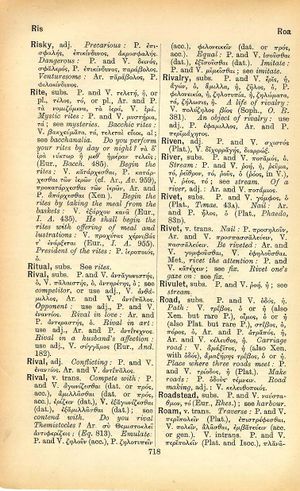rival: Difference between revisions
(3) |
m (Woodhouse1 replacement) |
||
| Line 1: | Line 1: | ||
{{Woodhouse1 | {{Woodhouse1 | ||
|Text=[[File:woodhouse_718.jpg|thumb|link={{filepath:woodhouse_718.jpg}}]] | |Text=[[File:woodhouse_718.jpg|thumb|link={{filepath:woodhouse_718.jpg}}]] | ||
===substantive=== | |||
[[prose|P.]] and [[verse|V.]] [[ἀνταγωνιστής]], ὁ, [[verse|V.]] [[παλαιστής]], ὁ, [[ἀντηρέτης]], ὁ; see [[competitor]], or use adj., [[verse|V.]] [[ἀνθάμιλλος]], [[Aristophanes|Ar.]] and [[verse|V.]] [[ἀντίπαλος]]. | |||
[[opponent]]: use adj., [[prose|P.]] and [[verse|V.]] [[ἐναντίος]]. | |||
[[rival in love]]: [[Aristophanes|Ar.]] and [[prose|P.]] [[ἀντεραστής]], ὁ. | |||
[[rival in art]]: use adj., [[Aristophanes|Ar.]] and [[prose|P.]] [[ἀντίτεχνος]]. | |||
[[rival in a husband's affection]]: use adj., [[verse|V.]] [[σύγγαμος]] ([[Euripides|Eur.]], ''[[Andromache]]'' 182). | |||
===adjective=== | |||
[[conflicting]]: [[prose|P.]] and [[verse|V.]] [[ἐναντίος]]. [[Aristophanes|Ar.]] and [[verse|V.]] [[ἀντίπαλος]]. | |||
===verb transitive=== | |||
[[compete with]]: [[prose|P.]] and [[verse|V.]] [[ἀγωνίζεσθαι]] (dat. or [[πρός]], acc.), [[ἁμιλλᾶσθαι]] (dat. or [[πρός]], acc.), [[ἐρίζειν]] (dat.), [[verse|V.]] [[ἐξαγωνίζεσθαι]] (dat.), [[ἐξαμιλλᾶσθαι]] (dat.); see [[contend with]]. | |||
[[do you rival Themistocles]]? [[Aristophanes|Ar.]] σὺ [[Θεμιστοκλεῖ ἀντιφερίζεις]]; (''[[Equites]]'' 813). | |||
[[emulate]]: [[prose|P.]] and [[verse|V.]] [[ζηλοῦν]] (acc.), [[prose|P.]] [[ζηλοτυπεῖν]] (acc.), [[φιλονεικεῖν]] (dat. or [[πρός]], acc.). | |||
[[equal]]: [[prose|P.]] and [[verse|V.]] [[ἰσοῦσθαι]] (dat.), [[ἐξισοῦσθαι]] (dat.). | |||
[[imitate]]: [[prose|P.]] and [[verse|V.]] [[μιμεῖσθαι]]; see [[imitate]]. | |||
}} | }} | ||
{{esel | {{esel | ||
Revision as of 08:50, 20 May 2020
English > Greek (Woodhouse)
substantive
P. and V. ἀνταγωνιστής, ὁ, V. παλαιστής, ὁ, ἀντηρέτης, ὁ; see competitor, or use adj., V. ἀνθάμιλλος, Ar. and V. ἀντίπαλος.
opponent: use adj., P. and V. ἐναντίος.
rival in love: Ar. and P. ἀντεραστής, ὁ.
rival in art: use adj., Ar. and P. ἀντίτεχνος.
rival in a husband's affection: use adj., V. σύγγαμος (Eur., Andromache 182).
adjective
conflicting: P. and V. ἐναντίος. Ar. and V. ἀντίπαλος.
verb transitive
compete with: P. and V. ἀγωνίζεσθαι (dat. or πρός, acc.), ἁμιλλᾶσθαι (dat. or πρός, acc.), ἐρίζειν (dat.), V. ἐξαγωνίζεσθαι (dat.), ἐξαμιλλᾶσθαι (dat.); see contend with.
do you rival Themistocles? Ar. σὺ Θεμιστοκλεῖ ἀντιφερίζεις; (Equites 813).
emulate: P. and V. ζηλοῦν (acc.), P. ζηλοτυπεῖν (acc.), φιλονεικεῖν (dat. or πρός, acc.).
equal: P. and V. ἰσοῦσθαι (dat.), ἐξισοῦσθαι (dat.).
imitate: P. and V. μιμεῖσθαι; see imitate.
Spanish > Greek
ἐνστάτης, ἀνταγωνιστής, ἀντίπαλος, ἁμιλλητήρ, ἀντίταγμα, ἄνταθλος, ἀπέλλητος, ἀντίφαρις, ἀνθάμιλλος, ἀντεραστής, ἀντίτεχνος

